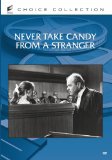| Reviews & Columns |
|
Reviews DVD TV on DVD Blu-ray 4K UHD International DVDs In Theaters Reviews by Studio Video Games Features Collector Series DVDs Easter Egg Database Interviews DVD Talk Radio Feature Articles Columns Anime Talk DVD Savant Horror DVDs The M.O.D. Squad Art House HD Talk Silent DVD
|
DVD Talk Forum |
|
|
| Resources |
|
DVD Price Search Customer Service #'s RCE Info Links |
|
Columns
|
|
|
Never Take Candy From a Stranger (Never Take Sweets From a Stranger, Sony Choice Collection)
Harrowing suspense from Hammer. Sony Pictures' Choice Collection line of hard-to-find cult and library titles has released Never Take Candy From a Stranger (original U.K. title: Never Take Sweets From a Stranger), the 1960 "horror" film from famed Hammer Studios (released here by Columbia Pictures) starring Patrick Allen, Gwen Watford, Janina Faye, Niall MacGinnis, Alison Leggatt, Bill Nagy, Michael Gwynn, Estelle Brody, Robert Arden, and Felix Aylmer. Hammer's first and last attempt at an out-and-out "message" movie--the dangers of child molesters...along with equally nefarious small-town politics--Never Take Candy From a Stranger was a notorious flop for the famed British studio during a time when its straight horror outings were making Hammer an international name. Seen today, despite its modern trappings and its decidedly un-supernatural crimes, Never Take Candy From a Stranger fits perfectly into Hammer's nightmarish world of fear and terror; for my money, it's one of their most frightening, accomplished endeavors. No extras for this sharp, sharp black and white widescreen transfer.

In a small town in the Jamestown area of Ontario, Canada, a sick, twisted pervert, Clarence Olderberry, Sr. (Felix Aylmer), spasmodically shakes at the sight of little 11-year-old Lucile Demarest (Frances Green) and her new friend, 9-year-old Jean Carter (Janina Faye), as they play together on a rope swing near Olderberry's mansion. When Jean jumps off the swing, she loses her candy money, but Lucile assures her there's a place where they can get candy for free...as she leads Jean to Olderberry's house. Later that night, when Jean's father, Peter Carter (Patrick Allen), the town's new high school principal and his English wife, Sally (Gwen Watford), return home, they learn from Jean, to their horror, that Jean and Lucile were asked to take off their clothes and dance together for Olderberry in his upstairs bedroom. Sally's mother, Martha (Alison Leggatt), advises caution since Jean doesn't appear to be hurt, and they don't know what kind of crime, if any, has actually been committed--advice that Peter seems to go along with--until Jean has a screaming nightmare about Olderberry. That's when Peter and Sally decide to press charges. Big mistake. You see, wealthy, powerful Olderberry built the town with his lumber mill, and everyone in town is beholden to him. The police chief, Captain Hammond (Budd Knapp), in an effort to dissuade the Carters from pressing charges, goes so far as to suggest what Olderberry did was all innocent...as he had done several times before. Olderberry's son, Richard (Bill Nagy), warns he'll not only have Peter's job, but that he'll personally order his lawyers to destroy what's left of Jean's innocence on the stand if the Carters pursue this matter. Even Lucile parents dummy up, conveniently sending her out of town so she can't testify as a witness to the crime. Undaunted, the Carters proceed, leading to a sensational criminal trial--one they lose due to their refusal to let Jean be further abused on the stand by the Olderberry's repulsive defense attorney (Niall MacGinnis). Defeated, their lives ruined, the Carters plan to leave town, but little do they know that the horror has just begun....
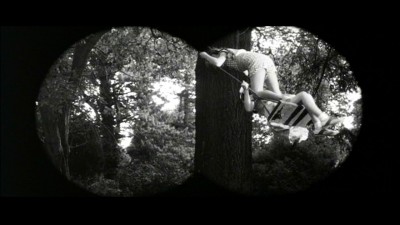
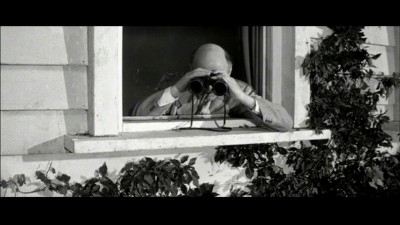
I'm not sure I buy the frequently parroted theory that Never Take Candy From a Stranger's failure at the box office was because 1960 audiences "just weren't ready" for a serious movie on the subject of child molestation. After all...when are audiences ever "ready" for a movie on such a subject, as if "child molester flick" is ever going to be something like "a heist movie" or "a Western shoot 'em up" or a "spy picture" that general audiences actively seek out in droves? And particularly a movie like Never Take Candy From a Stranger, which, despite a rigorously non-exploitive approach, doesn't hold back on dramatizing the exceedingly uncomfortable horrors associated with that most deviant, reprehensible crime. Are large, mainstream audiences ever going to line up to "enjoy" that kind of movie, showing little girls being molested, as the above theory seems to imply they someday will, once newer, presumable smarter or more savvy audiences come along (beware the insidious snobbery of new critics who imagine everyone was somehow dumber before they and their generation came along)? On subject matter alone, regardless of its eventual artistic worth, Never Take Candy From a Stranger was always going to be a marginal-at-best performer, despite anyone's expectations at Hammer, and if anything, the studio's schizophrenic approach to marketing the movie probably drove away the remainder of whatever audience was going to show up in the first place. Imagine being the studio that was making money off violent, color-soaked comic-book horror outings like Dracula and The Mummy trying to market a "serious" movie about child molestation to the highbrow critics and audiences...with a sleazy, nasty exploitation title like Never Take Sweets From a Stranger? Mainstream audiences probably took one look at that title and balked at ever asking a ticket seller for, "Two adults and two children, please, for Never Take Sweets From a Stranger," while most mainstream critics, snorting in derision at Hammer's schizo attempt to sell an "important" sordid thriller, bypassed such a title entirely. Even the few pervs who may have shown up probably told their buddies to stay away because instead of getting their cheapjack grindhouse thrills, they instead found a taut, intelligent thriller that was as much about political and social corruption, as it was about child molestation.
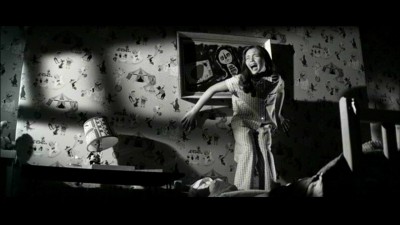
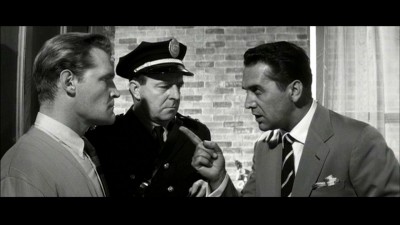
Written by John Hunter (The Intruder, The Pirates of Blood River, The Grey Fox), based on Roger Garis' The Pony Cart, and directed by Cyril Frankel (School for Scoundrels, Don't Bother to Knock, The Witches), Never Take Candy From a Stranger is filled with clever little touches that unnerve us on a subtle level, like the strangely dreamlike, sinister opening, with the girls playing on the rope swing (the isolated creaking of the taut rope on the soundtrack is a nice metaphor for not only old man Olderberry's sick erotic compulsions tied down and getting ready to snap, but also foreshadowing the (swing) bottom dropping out of the girls' normal lives), or vague, unspoken insinuations of plot detail that let our imaginations run towards the tawdry (when Jean describes Olderberry making sounds "like singing...but he wasn't singing," before he "fell asleep"). Plenty of odd, nagging clues and sidebar details are presented with a light hand, with no further explanation. How did Lucile know about getting candy at old man Olderberry's? Was she one of his previous victims? Is that why she convinced the reluctant Jean it was "okay" to strip down and dance for him, since she had done it before and wasn't hurt...and no adult said what Olderberry did was wrong? How about the meet-and-greet at the school, where everyone already seems to know something is going on with Olderberry, before they trail off, their thoughts unspoken as they contemplate his bust in the school lobby? How about Martha's insistence they do nothing when they discover what happened to Jean? Is it prudence on her part, or because she too was a victim of a sexual predator (her childhood story of repeatedly witnessing a local man exposing himself to her and her friends on their way to school) and knows the consequences of "telling?" Or is it something else, something more like economic dependence, and the fear she'll lose her home with her daughter and step-son when they're ruined in their new town?
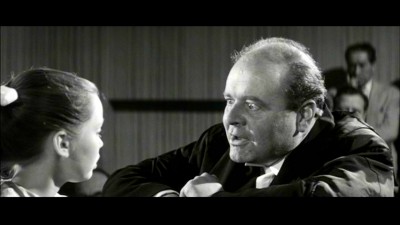
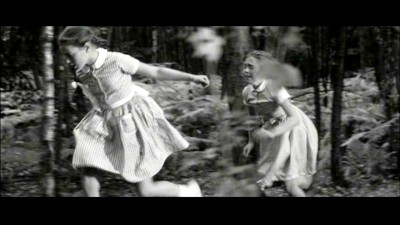
For a movie we expect to focus on the sensationalistic aspects of child molestation, Never Take Candy From a Stranger spends far more time on creating a rather remarkable atmosphere of outright, naked persecution of the Carters in the small, insular, corrupt town. No one even questions old man Olderberry's motives; he's not the problem, the "outsiders" Carters are. When they discover the crime that's been committed against their daughter, the first person the Carters go to is the town's police captain, the titular head of immediate justice in the town...who basically proceeds to call them liars and warns them to shut up if they know what's good for them. The Carters learn quickly their place in the town's society is an illusion ("You and your husband ain't members of nothing!" he sneers at her), amplified by her "otherness," since she's British (the captain's inferiority complex reaches a zenith when he projects onto her his own feelings of inadequacies, insisting she thinks of the town's citizens as "stupid colonials"). No real help is coming from their schoolteacher friend Neal Phillips (Gaylord Cavallaro), who knows the score about Olderberry, but who won't stick his neck out to offer any real support to Peter. The town gossips about the case, including the horrible Sylvia (Helen Horton), who insists most people think it's Jean's fault, being a "tease." So much for the citizens welcoming and supporting their new high school principal and his lovely family.
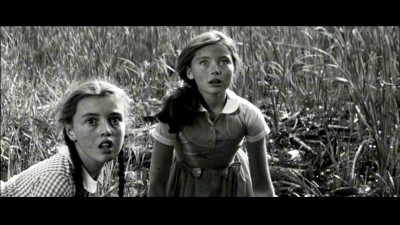
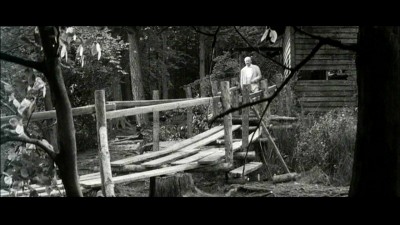
Olderberry's son, who runs the local mill which single-handedly powers the town's economy, turns to threatening the family when his soft-sell about a "simple misunderstanding" with his father doesn't work. Acting as if he owns Captain Hammond (he's incredulous when the cop actually serves a warrant), along with everyone else that lives in his town, is it any wonder that old man Olderberry feels like he "owns" the little girls in town, to do with as he pleases? After all...who's telling him, "No,"? If he can force Lucile's father--who works in his mill--to clam up, why can't he buy off everyone? The level of corruption in the town goes deep; even the doctor at the private sanitarium (funded in part by Olderberry) where Olderberry was treated before, admits the old man's files have been scrubbed. The Carters can't even get justice in the one place they're supposedly guaranteed it: the courtroom, where the laws are stacked against a child testifying in such a case. Here, they have to endure not only the spectacle of having their child called a liar with a "diseased imagination," but also hear insinuations that they are the perverts, when Jean admits to innocently dancing naked after a bath, in front of her father. The final straw comes when the judge warns Peter that the defense will even have the right to physically invade Jean's privacy--in essence, finishing the job old man Olderberry didn't get to--by means of a medical exam testing her virginity: a sickening prospect that makes the couple fold their complaint. Even when the Carters lose everything, Richard shows how deep the rot goes by actually offering to help Peter in an effort to boost Richard's image ("I want people to see how generous I can be with people who cross me," he openly calculates, without a trace of embarrassment). We recoil at what Olderberry did to the little girls (and what he's going to do...), but we're no less horrified at the picture of a truly perverted society that attacks--out of self-interest, greed, and puerile interest--the innocent victims of a crime.


If Never Take Candy From a Stranger had stopped there, it would have been a notable drama, but astonishingly, the movie doesn't back off, going instead for the jugular when the movie's last twenty minutes are devoted to the final, most devastating attack on the Carters: old man Olderberry's deadly assault on Lucile and Jean. SPOILERS WARNING! Here, the movie's visceral horror is unleashed, as director Frankel systematically tightens the screws, creating almost unbearable suspense cross-cutting between Peter and the town's growing panic at the realization that the Carters were right, and Olderberry chasing the girls into the woods. The girls think they're safe in a rowboat on Moon Lake, but Olderberry gets off one last trick by pulling their tethered boat back from seeming safety (nice bookending with the rope from the opening scene), before Frankel cuts away as our imaginations do the rest. Not content to stop there, Frankel drives home Olderberry's crime when he shows a sickening shot of the twisted body of a dead child (an unbelievable image for 1960), as Felix Aylmer, in a transcendent moment, preens and puts his hands out for the horrified cops and his son, as if to proudly say, "Look at what I did!" before his face twists into insanity. The movie should have ended there, with Jean being the child that's killed instead of Lucile, but the movie pulls its punches at the very end, not even giving us the satisfaction of creep Richard getting his just desserts. Still, Hunter's and Frankel's portrait of a morally bankrupt town protecting a sexual deviant and child killer, just to keep their jobs and the status quo, is one you won't ever forget.
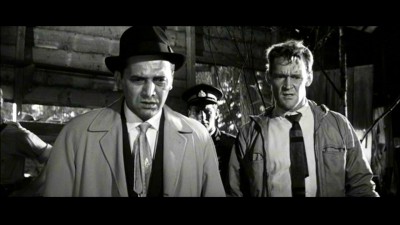
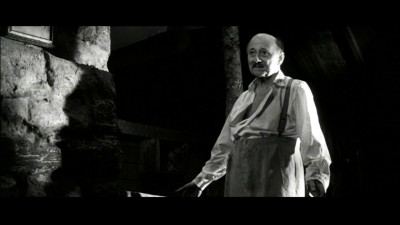
The DVD:
The Video:
This looks to be the same transfer Sony used when Never Take Candy From a Stranger was released on their 2010 Icons of Suspense: Hammer Films disc set. The anamorphically-enhanced, 2.35:1 black and white transfer looks immaculate, with Freddie Francis' frames super-sharp, with blacks that hold and little if any grain. Contrast is a little hot at times.
The Audio:
The Dolby Digital English mono audio track is equally clean, with little hiss. No subtitles or closed-captions available.
The Extras:
No extras, not even a menu, for Never Take Candy From a Stranger.
Final Thoughts:
One of Hammer's least-known "horror" titles...and one of its greatest. Not content to simply manufacture a nail-biting suspenser about a child molester threatening little girls, Never Take Candy From a Stranger also paints a portrait of an equally corrupt, evil small town that protects that monster at the expense of his victims, simply because he pays the town's bills. One of the best suspense outings of the 1960s, I'm highly, highly recommending Never Take Candy From a Stranger.
Paul Mavis is an internationally published movie and television historian, a member of the Online Film Critics Society, and the author of The Espionage Filmography.


|
| Popular Reviews |
| Sponsored Links |
|
|
| Sponsored Links |
|
|
| Release List | Reviews | Shop | Newsletter | Forum | DVD Giveaways | Blu-Ray | Advertise |
|
Copyright 2024 DVDTalk.com All Rights Reserved. Legal Info, Privacy Policy, Terms of Use,
Manage Preferences,
Your Privacy Choices | |||||||









